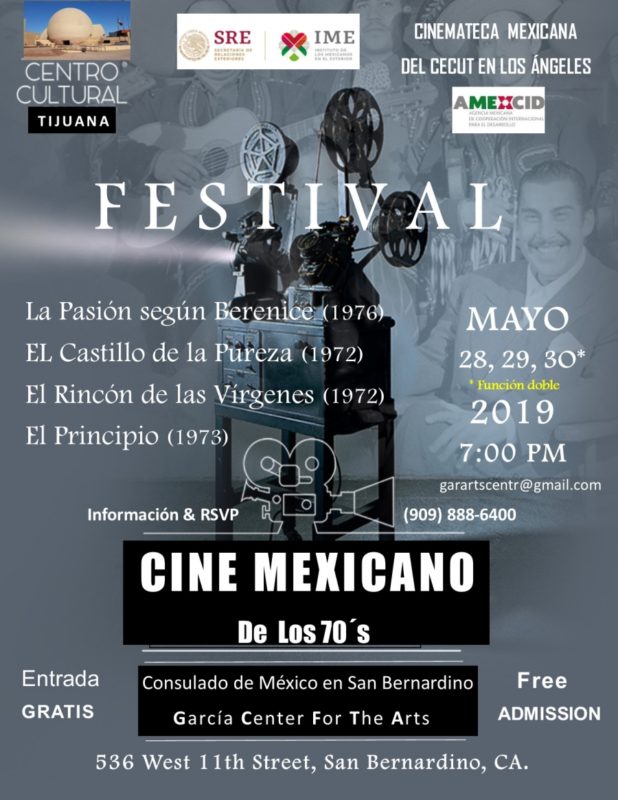SAN BERNARDINO, CA – From May 28th through May 30th, 2019, the Garcia Center for the Arts and the Consulate of Mexico in San Bernardino, in collaboration with the Cinemateca Mexicana del CECUT in Los Angeles, present this film series. These will be projected with English subtitles, and the screenings are free of charge.To RSVP call (909) 888-6400 and for info email to: garartscenter@gmail.com
The engagement will take place at the Garcia Center for the Arts – 536 W. 11th St. in San Bernardino at 7pm:
La Pasión Según Berenice (1976 – Jaime Humberto Hermosillo) – Tuesday, May 28th
El Castillo de la Pureza (1972 – Arturo Ripstein) – Wednesday, May 29th
El Rincón de Las Virgenes (1972 – Alberto Issac) – Thursday, May 30th
*El Principio (1978 – Gonzalo Martinez Ortega) – Thursday, May 30th (*9pm)
A discussion with the audience led by film critic Juan Rodriguez Flores will follow the screenings
“I’m excited to have a conversation of a time marked by social and political transformation in Mexico that prompted its filmmakers to challenge the traditional national narrative of bucolic country life and of epic family melodrama which prevailed throughout the Era of Golden Cinema. The Mexican filmmakers of the 70s showed great courage, and ingenuity, in their portrayals of family dysfunction, political corruption, and passion not bound by conservative conventions.” Said CECUT’s Binational Director Dr. Juan Rodriguez Flores.”
“This exciting partnership shows how deeply the roots of Art truly has no borders” said Dr Ernest Garcia, Executive Director and namesake of the Garcia Center for the Arts
“I’m looking forward to a strong collaboration between the Garcia Center and the Consulate of Mexico in San Bernardino that will engage local residents in thought-provoking programming from Mexico.” Expressed Tammy Garcia Chiang, Consulate of Mexico in San Bernardino, Community Affairs Coordinator.
About Mexican Cinema of the 70s
“At the aftermath of the Golden Age of Mexican cinema, the 70’s is one of the most important transitions in the history of cinema. It is when an opening is finally given to new filmmakers in Mexico. Before those years the industry was very closed and the productions were very large and with stories written with the sole purpose of taking the audience to the theaters. It was a very familiar formula of cinema with its exceptions. It is from the 70s that new directors arrive with the concern to present new stories, most of them influenced by European cinema. ” – Ulises Castañeda,Crónica


